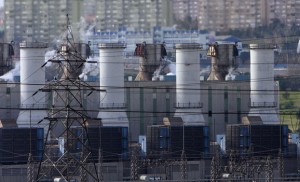 Περιτριγυρισμένο από το 70% του παγκόσμιου πετρελαίου και φυσικού αερίου, η Τουρκία είναι σχεδόν πλήρως εξαρτημένη από τις εισαγωγές για να καλύψει τις ανάγκες της για ενέργεια υδρογονανθράκων.
Περιτριγυρισμένο από το 70% του παγκόσμιου πετρελαίου και φυσικού αερίου, η Τουρκία είναι σχεδόν πλήρως εξαρτημένη από τις εισαγωγές για να καλύψει τις ανάγκες της για ενέργεια υδρογονανθράκων.
Παρά την σκληρή πραγματικότητα, ο υπουργός της Τουρκίας Ενέργειας Τανέρ Γιλντίζ είπε: «Στόχος μας είναι να έχουμε μια Τουρκία το 2023 που δεν θα εισάγει πετρέλαιο ή φυσικό αέριο,” και, “Θα συνεχίσουμε το έργο μας, επίσης, στροφή της Τουρκίας σε ενεργειακό κόμβο
By:Tulin Daloglu for Al-Monito
Surrounded by 70% of the world’s oil and natural gas reserves, Turkey is almost completely dependent on imports to meet its needs for hydrocarbon energy. Despite this hard reality, Turkey’s Minister of Energy Taner Yildiz said, “We aim to have a Turkey in 2023 that won’t import oil or natural gas,” and, “We will also continue our work turning Turkey into an energy hub.”
Although Turkey has the best geographic position in this region to be the major European gas hub, Ankara’s unintelligible policies toward the Middle East are now undermining this objective. While Prime Minister Recep Tayyip Erdogan has mobilized the masses to his side by using the traditional animosity toward Israel, and Ahmet Davutoglu, his foreign minister, took the stage with a policy of “zero problems with neighbors,” Turkey’s gain out of this approach seems insignificant.
To the contrary, Turkey now has problems with all of its neighbors — including the two oil and natural gas giants of the region, Iran and Iraq, both sharing long borders with Turkey. Its relations with Israel, Greece and the Greek Cypriots are also troublesome — to say the least.
As Al-Monitor Turkey Pulse has reported here, and here, the discovery of hydrocarbon reserves in the Eastern Mediterranean basin not only caught the Turkish leadership unprepared, it also revealed the shortsightedness of their approach of designating Israel as an enemy. When Turkey and Israel engaged in dialogue on building an “infrastructure corridor” linking port cities of these two countries, which would have included five separate underwater pipelines for oil, natural gas, electricity, water and communications, they were also seeking to cement a strategic partnership. While anyone who can repair the personal and political rupture between Prime Minister Erdogan and the Israeli leadership will deserve the Nobel Peace Prize, the fact is that the loss of Turkey as a partner isn’t really all that damaging for Israel.
“When we were talking about the infrastructure corridor, it was 2005 and later 2007,” Binyamin Fuad Ben Eli Ezer, former Israeli minister of infrastructure told Al-Monitor. “I tried to find a way to buy gas from Gazprom, Russia, as quick as possible. Today, we don’t need that. The new discoveries in Leviathan and Tamar will be good for us for at least 300 years.”
Leviathan and Tamar are newly discovered huge gas fields in the Mediterranean Sea off the coast of Israel. Israel certainly has the full sovereignty to explore and exploit these fields. The issue that brings Turkey into the equation is more about the way the natural gas will be brought to surface and carried to international markets for consumption. Ben Eli Ezer, who was the founding father of the idea of the “infrastructure corridor,” also sheds some light on this dilemma.
“Erdogan blessed it. I went with all the maps and the work we’ve done and we found that it is more than possible to do it by these underwater pipelines. It’s an economic one, good one, too,” Ben Eli Ezer said. “If you ask me something happened with Calik. He came to Israel eight or nine times. Both [Ehud] Olmert and [Ariel] Sharon were more than happy about this project from the beginning.”
A giant company with diversified interests from energy to media, Çalik Holding was tasked with preparing a feasibility report by the Erdogan government. Chief Executive Officer Ahmet Çalik is also known as a close friend of Erdogan. “Çalik kept it at ‘wait and see.’ Then the Mavi Marmara flotilla incident happened, and everything blew up,” Ben Eli Ezer said. That still leaves room to speculate as to whether this “infrastructure corridor” between Turkey and Israel that was going to build pipelines under the deep waters of the Mediterranean was really doable. It’s not really the distance that matters, but the engineering that this project requires is certainly a challenging one.
Ben Eli Ezer, however, thinks that if people put their minds to it, the project is still possible and that he would prefer to do it with Turkey and normalize relations with the Ankara government.
“I want to make a statement,” Ben Eli Ezer told Al-Monitor. “The government of Israel, the prime minister of Israel — as far as I know, he’s more than interested to bring back normalization of the relation with Turkey. He’s keen to find the formula that will satisfy both sides.” He then went on to say this: “You see, there is two almost super nations that we have to consider in the Middle East — Turkey and Egypt. We have border with Egypt, which makes it more important for us. But we also don’t need Turkey on the other side.”
Yet the Erdogan-Davutoglu policy is crystal clear on using Israel as a whipping boy at every opportunity. So far, this approach has won them the masses on the Arab street. Erdogan continues to claim that the Israeli-Palestinian issue is the mother of all problems in the region, as if the reason people in Tunisia, Libya, Egypt and Syria put their lives on the line to bring down dictators had anything to do with Israel’s unresolved dispute with the Palestinians. Israeli officials have expressed privately many times that under these circumstances, it’s not possible to trust Turkey anymore. “It takes years to build trust, and takes only minutes to dissolve it,” one senior Israeli official told — Although Ben Eli Ezer expressed a desire, despite all these challenges, to rejuvenate the “infrastructure project,” he also said, “But I don’t see how.”
In short, a Turkey in fights with all the countries in the region rich with oil and natural gas reserves only harms its own long-term interests — and undermines the goals that Turkey’s Energy Minister Taner Yildiz has set: “We aim to have a Turkey in 2023 that won’t import oil or natural gas,” and “We also continue our work turning Turkey into an energy hub.”
Tulin Daloglu is a columnist for Al-Monitor and a foreign-policy analyst based in Ankara, Turkey. She tweets @TulinDaloglu.
Read more: http://www.al-monitor.com/pulse/originals/2013/01/israel-turkey-tensions-energy.html#ixzz2I1ovDBhhr









